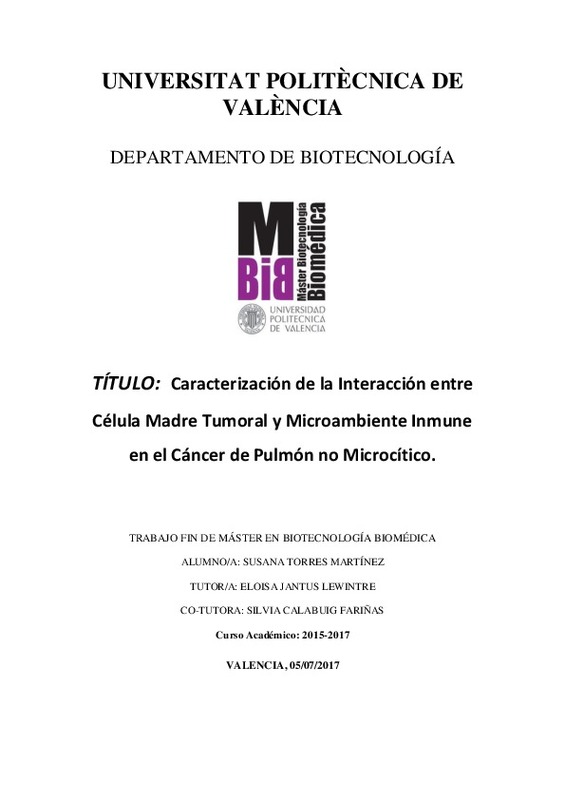|
Resumen:
|
Non-small cell lung cancer (NSCLC) is one of the solid tumors with the highest mortality in the world. The acquisition of treatment¿s resistances, together with the lack of treatment¿s effectiveness on Cancer Stem Cells ...[+]
Non-small cell lung cancer (NSCLC) is one of the solid tumors with the highest mortality in the world. The acquisition of treatment¿s resistances, together with the lack of treatment¿s effectiveness on Cancer Stem Cells (CSCs) and evading immune mechanism produced by the tumor are one of the main causes of the high mortality. CSCs in NSCLC are targets poorly recognized by immune surveillance system, making an important mechanism of tumor immune evasion which favors an immunosuppressive microenvironment which is crucial during tumorigenesis. What is more, immune cells in the tumor microenvironment are able to modulate the tumor cells, making acquire stem-like characteristics, favouring further progression, recurrence, metastasis and resistance to treatment. Consequently, due to the fact that interactions between CSCs and immune cells are involved in the down-regulation of the immune response allowing tumor escape from immune surveillance, a better understanding on how CSCs interacts with their immune microenvironment in NSCLC will result in an improved characterization of patient¿s immune contexture (through the use of biomarkers).
The aim of this work is the characterization of the interactions between CSCs and its immune microenvironment. The study is performed on NSCLC cultures (cell lines and primary tumor cell cultures) and used to: (i) analyse the CSC¿s production of soluble factors ( cytokines, growth factors) with immunosuppresive or immunoregulator capacity by multiplexed assays (Luminex), (ii) determine the influence of soluble factors produced by lung tumorspheres on different populations of immune cells, and (iii) identify mechanism involved in the modulation of immune cells function by CSCs.
In conclusion this study has a translation approach through the validation of the findings made during the exploratory phase of this work, on the search for biomarkers in cohorts of CPNM patients and immune design strategies adapt to each patient. Moreover, the results of this study will result in the development of new targeting molecules modulating interactions between CSCs and the microenvironment immune tumoral, in order to remove the population of CSCs
[-]
El cáncer de pulmón no microcítico (CPNM) sigue siendo uno de los tumores sólidos con mayor mortalidad en el mundo. La adquisición de resistencias a los tratamientos, unido con la falta de efectividad de los mismos sobre ...[+]
El cáncer de pulmón no microcítico (CPNM) sigue siendo uno de los tumores sólidos con mayor mortalidad en el mundo. La adquisición de resistencias a los tratamientos, unido con la falta de efectividad de los mismos sobre las células madre tumorales (Cancer Stem Cells, CSCs) y los mecanismos de inmunoevasión promulgados por el tumor, son unas de las causas principales que explican la elevada mortalidad. Las CSCs en CPNM son dianas pobremente reconocidas por el sistema de vigilancia inmunológica, formando un importante mecanismo de escape inmune tumoral favoreciendo la existencia de un ambiente inmunosupresor el cual es crucial durante la tumorigénesis. Además, las células inmunes que infiltran el tumor son también capaces de modular la capacidad de las células tumorales, haciendo que adquieran características stem-like, favoreciendo aún más la progresión, recurrencia, metástasis y resistencias a los tratamientos. En consecuencia, es necesario profundizar en el estudio de la interrelación entre las CSC pulmonares y su microambiente inmune trasladando los hallazgos a la búsqueda de biomarcadores que ayuden a mejorar el pronóstico.
El objetivo del presente trabajo consiste en estudiar esta interrelación entre el microambiente inmune y las CSC pulmonares. Para ello, el estudio se realizará en células de CPNM (líneas celulares y cultivos derivados de muestras de pacientes) y consistirá en (i) valorar en sobrenadante de medio de cultivo de células cultivadas en monocapa y en esferas la presencia de mediadores solubles (citosinas, factores de crecimiento, etc) con capacidad inmunosupresora o inmunorreguladora mediante un ELISA multiparamétrico (Luminex), (ii) analizar la influencia de los mediadores solubles producidos por las tumor-esferas sobre diferentes poblaciones de células de la inmunidad y por último (iii) identificar posibles mecanismos involucrados en la modulación que ejercen las células inmunes que infiltran el tumor sobre células tumorales y las CSCs.
En conclusión, este trabajo tiene una clara vocación traslacional, a través de la posterior y futura validación de los hallazgos realizados durante esta fase exploratoria. Además, los resultados de este trabajo podrían ser generadores de nuevas hipótesis sobre posibilidades terapéuticas dar lugar al desarrollo dirigidas a la modulación de las interacciones entre las CSCs y el entorno inmune tumoral, con el objetivo de eliminar la población de CSCs.
[-]
|







